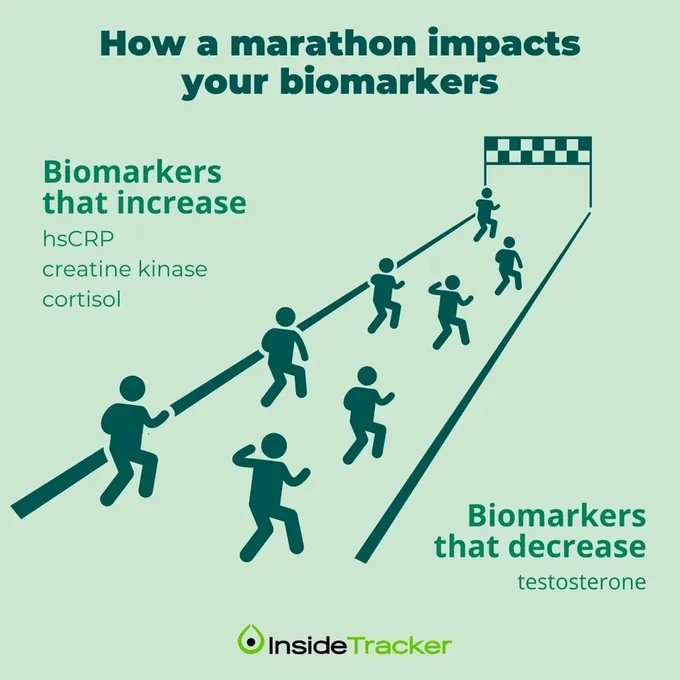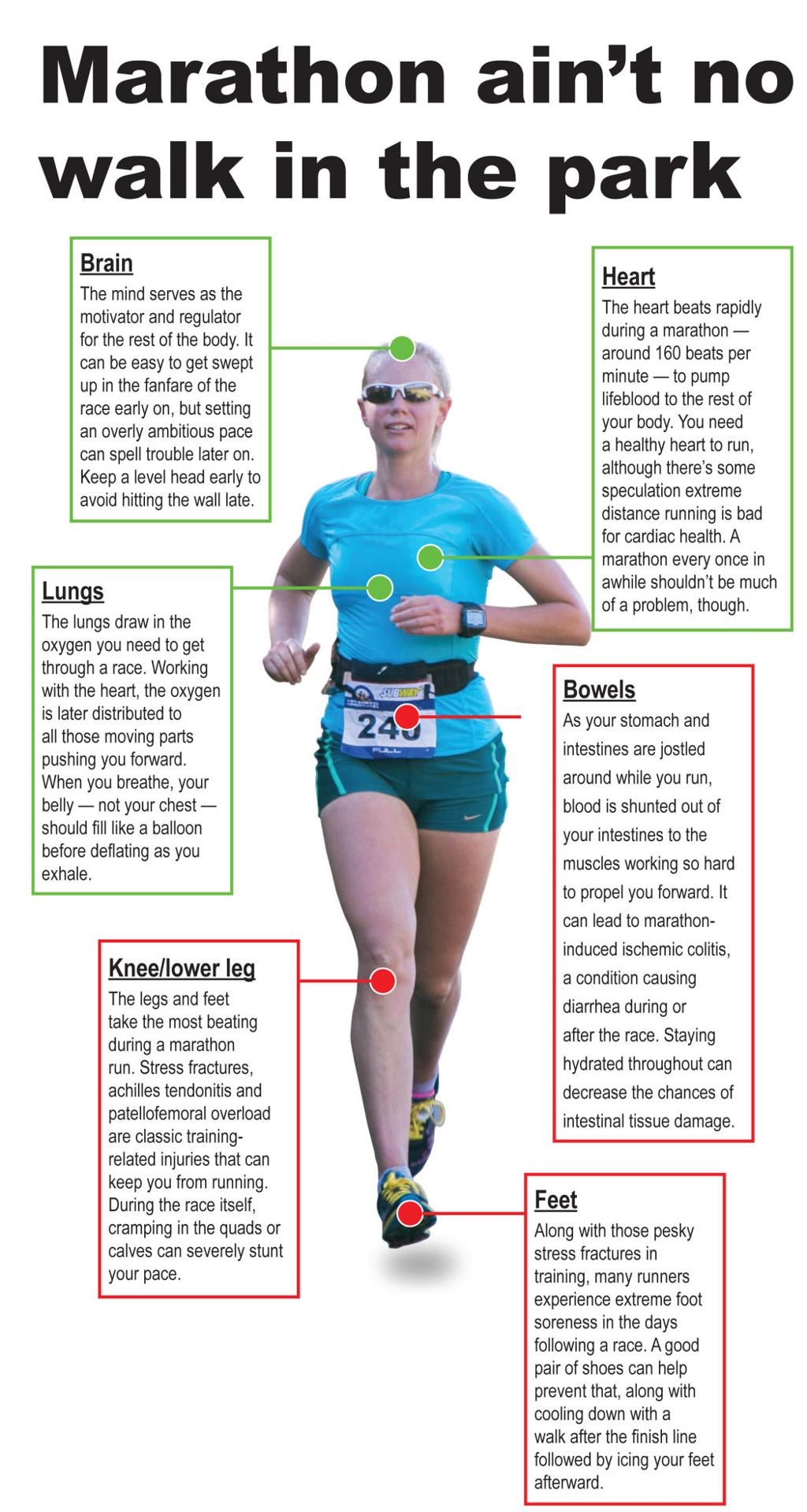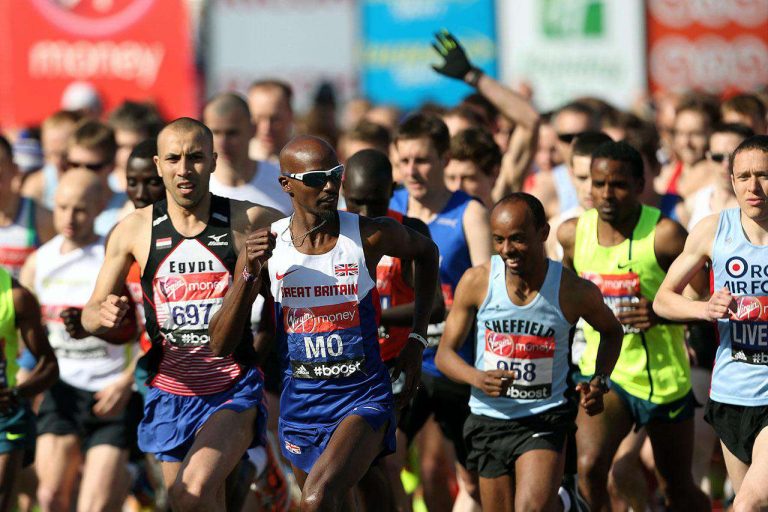How Hard is a Marathon on Your Body?
A marathon is extremely challenging for your body, causing significant physical stress and potential long-term damage. Running 26.2 miles can strain your muscles, joints, and cardiovascular system, leading to injuries such as stress fractures, muscle tears, and heart problems.
This level of exertion can also result in dehydration, electrolyte imbalance, and even kidney damage. Furthermore, the intense physical demands of a marathon can weaken your immune system, leaving you vulnerable to infections and illness. Overall, the toll that a marathon takes on your body should not be underestimated, and it is essential to train properly, listen to your body, and prioritize recovery to minimize the potential impact.
The Physical Impact Of Running A Marathon
Running a marathon can take a toll on your body. Let’s explore the physical impact in more detail.
Muscle Fatigue And Damage
During a marathon, muscles undergo significant stress. This leads to fatigue and micro-tears in muscle fibers.
Bone And Joint Stress
Marathons can place immense stress on your bones and joints, leading to potential injuries and long-term issues.

Credit: www.insidetracker.com
The Cardiovascular Toll Of Running 26.2 Miles
Completing a marathon is a remarkable achievement that requires immense physical endurance. Running 26.2 miles is not only a test of mental strength, but it also places significant demands on your cardiovascular system. In this blog post, we will explore the cardiovascular toll that running a marathon takes on your body.
Increased Heart Rate
During a marathon, your heart works tirelessly to meet the increased demands for oxygen and fuel by your muscles. Your heart rate, which normally ranges between 60 to 100 beats per minute at rest, can skyrocket to 150 beats per minute or even higher during intense exercise.
This elevated heart rate is necessary to deliver oxygen-rich blood to your working muscles and remove waste products efficiently. With each pounding stride, your heart contracts forcefully to maintain the blood flow required to sustain the prolonged effort.
Impact On Blood Pressure
Running a marathon can have both immediate and long-term effects on your blood pressure levels. During the race, your blood pressure increases due to the increased cardiac output and the narrowing of blood vessels in your working muscles.
This temporary rise in blood pressure is a normal response to the physical stress placed on your body. However, individuals with pre-existing high blood pressure or heart conditions should consult with their healthcare provider before attempting a marathon. It is essential to ensure that your cardiovascular system can handle the elevated demands placed upon it.
After crossing the marathon finish line, your body gradually recovers from the cardiovascular strain endured during the race. It may take several days or even weeks for your heart rate and blood pressure to return to resting levels.
Long-term effects of marathon running on your cardiovascular system are generally positive. Regular endurance training, including marathon preparation, can improve your heart’s efficiency, strengthen your cardiovascular system, and lower your resting heart rate and blood pressure.
However, it is crucial to listen to your body and allow for appropriate recovery between marathons or intense training periods to prevent overtraining and reduce the risk of developing cardiovascular issues.
Increased Heart Rate |
Impact on Blood Pressure |
|---|---|
| During a marathon, your heart rate can rise significantly, exceeding 150 beats per minute. | Running a marathon leads to a temporary increase in blood pressure due to the heightened cardiac output and narrowed blood vessels. |
| Elevated heart rate is necessary to provide your muscles with oxygen-rich blood. | Individuals with high blood pressure or heart conditions should consult with their healthcare provider before attempting a marathon. |
- Your heart contracts forcefully to ensure adequate blood flow to sustain the prolonged effort.
- Recovery from the cardiovascular strain may take days or weeks after crossing the marathon finish line.
- Regular marathon training can improve heart efficiency, strength, and lower resting heart rate and blood pressure.
- Proper recovery between marathons is essential to prevent overtraining and reduce the risk of cardiovascular issues.
Mental And Emotional Challenges Of Marathon Running
Running a marathon is not only physically demanding but also mentally and emotionally challenging. The grueling 26.2-mile race pushes your limits in more ways than one, and it takes more than just physical strength and endurance to complete such a feat.
Psychological Fatigue
Endurance events like marathons test your mental strength as much as your physical abilities. The long hours of running can lead to psychological fatigue, which can make it difficult to stay motivated and focused throughout the race.
The sheer length of a marathon requires runners to maintain a high level of mental resilience. It’s not uncommon for doubts and negative thoughts to creep in, especially during the later stages of the race. Pushing through these mental barriers is crucial to keep going and reach the finish line.
Dealing With Discomfort
Marathon running can also be uncomfortable both physically and mentally. The constant pounding on your feet and joints can lead to pain and discomfort, and maintaining the running form becomes a challenge as fatigue sets in.
Dealing with discomfort requires a strong mindset and the ability to push through the pain. Runners need to find ways to stay mentally focused and distract themselves from the physical discomfort. This could involve using positive self-talk, visualizing the finish line, or breaking the race down into smaller, manageable sections.
Additionally, staying mentally strong also helps in managing the discomfort. By acknowledging and accepting the pain, runners can develop mental resilience and continue pushing forward, even when their body wants to give up.
Overall, marathon running is not just a physical battle; it is also a mental and emotional challenge. Overcoming psychological fatigue and learning to deal with discomfort are vital aspects of completing a marathon. With proper mental preparation and a strong will, runners can conquer these challenges and experience the incredible sense of accomplishment that comes with crossing the finish line.

Credit: www.wired.com
Recovery Process After Completing A Marathon
Completing a marathon is a significant physical and mental achievement, but the real challenge begins with the recovery process that follows.
Muscle Recovery
Properly resting your muscles after a marathon is crucial for rebuilding and repairing microtears in the muscle fibers.
Incorporating light stretching and low-impact activities can help promote blood flow and aid in muscle recovery.
Rest And Hydration
Adequate rest is essential in allowing your body to recover and regenerate after the strenuous event.
Hydration plays a key role in replenishing lost fluids and electrolytes during the marathon.
Long-term Effects Of Regular Marathon Running
Regular marathon running can have significant long-term effects on the body, both positive and negative. While the physical and mental challenges of completing a marathon are well-documented, the impact of regular marathon running on the body over time is a topic of increasing interest.
Chronic Injury Risk
Marathon running can increase the risk of chronic injuries, such as stress fractures, tendonitis, and cartilage damage. The repetitive impact and strain on the body can lead to issues in the joints and soft tissues over time. It’s crucial for marathon runners to prioritize proper cross-training, strength training, and recovery techniques to minimize the risk of chronic injuries.
Cardiovascular Adaptations
Regular marathon running can lead to positive cardiovascular adaptations, including increased heart stroke volume, improved heart function, and enhanced endurance. The consistent training and endurance efforts involved in marathon running can lead to significant improvements in overall cardiovascular health, reducing the risk of heart disease and other cardiovascular conditions. It’s important for runners to undergo regular cardiovascular assessments to monitor these adaptations and ensure their heart health is maintained.

Credit: lauranorrisrunning.com
Frequently Asked Questions On How Hard Is A Marathon On Your Body
How Does Training For A Marathon Change Your Body?
Training for a marathon can lead to physical changes, such as improved cardiovascular endurance, muscle strength, and endurance. It can also help reduce body fat and increase bone density. Additionally, marathon training can improve mental toughness, boost metabolism, and enhance overall fitness levels.
What Are The Long Term Effects Of Marathon Running?
Marathon running can lead to improved cardiovascular health, weight management, and mental well-being. However, long-term effects may include joint wear and tear, heightened injury risk, and overtraining issues. Proper training, recovery, and listening to your body are crucial for long-term running success.
What Is The Marathon Effect?
The marathon effect refers to the impact of consistently creating high-quality content over time. By consistently publishing valuable content, websites can improve their search rankings, gain more organic traffic, and increase user engagement. It is a long-term strategy that helps websites to establish authority and credibility in their niche.
Conclusion
Marathons can push your body to its limits, causing strain and fatigue. It’s crucial to train properly and listen to your body to prevent injuries. Remember to rest, hydrate, and nourish your muscles post-race. Ultimately, the challenge of a marathon is not easy, but it can be rewarding with proper preparation and care.







